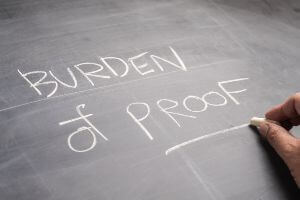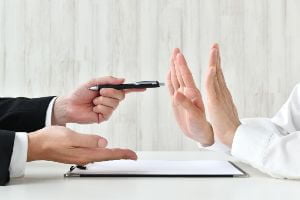 When people get injured because of another person’s negligence or reckless conduct, they may be able to recover compensation for damages that occur. However, victims cannot recover compensation unless they prove their injuries were a direct result of the other party’s negligence.
When people get injured because of another person’s negligence or reckless conduct, they may be able to recover compensation for damages that occur. However, victims cannot recover compensation unless they prove their injuries were a direct result of the other party’s negligence.
In other words, the burden of proof in these claims falls on the victim. The victim needs to provide evidence for his or her claim and evidence of the damages he or she suffered. If the case makes it to trial, the jury will need to decide if the victim’s claims are true based on the preponderance of the evidence.
Below, the experienced lawyers at TSR Injury Law discuss the burden of proof in personal injury claims. One of the most important takeaways for injured victims is that proving a case is a complex task that requires extensive knowledge of the law. You also need an experienced attorney who has handled a variety of cases.
At our firm, we have advocated for the injured for decades. We have secured more than $1 billion on behalf of our clients in Minnesota. Our Bloomington personal injury attorneys charge no upfront fees, and we manage each part of the legal process on your behalf.
Free consultation. Call to discuss your claim: (612) TSR-TIME.
Defining the Burden of Proof
One way to think about the burden of proof is that it is the minimum standard you must satisfy to legally establish a fact in court.
The minimum standard varies depending on the type of case. For example, in a criminal case the standard is guilt beyond a reasonable doubt. In a civil case, such as a personal injury case, the standard is the preponderance of evidence. Injured victims must prove the different elements of their case by the preponderance of the evidence.
Another way to think about the term preponderance of the evidence is that what you are claiming is more likely than not. If a jury believes a plaintiff’s claims are at least 51 percent true, the victim has met the preponderance of the evidence standard.
Why is the Burden of Proof on the Victim?
The burden of proof is on the victim in a personal injury claim because he or she is the one seeking compensation for damages. The defendant, which is often an insurance company in a personal injury case, is not obligated to prove their version of events is true. They can simply attack the evidence and argue it is not true.
It can be helpful to imagine if the roles in your case were reversed. What if another party is claiming you caused them to be injured even though you did not? Proving something did not happen is difficult. Therefore, the plaintiff has the burden of proving that you caused them to be injured.
The way this is set up helps to protect people from potentially being taken advantage of. Although many people are injured due to the negligence of others, there are people who attempt to commit fraud and take advantage of people who did not do anything wrong.
Satisfying the Burden of Proof in a Personal Injury Case
In a personal injury case, you must prove negligence occurred. Negligence is a legal concept that has four elements.
Duty of Care
You must establish that the at-fault party owed you an obligation to take reasonable steps to prevent you from getting injured. For example, drivers have an obligation to follow the rules of the road and not engage in reckless behaviors. A specific example of this is not driving while drunk.
Breach of a Duty of Care
When someone does not uphold a duty of care, it is said they breached the duty of care. Their actions or, in some cases their inaction, caused a duty of care to be breached.
If a driver could have avoided a collision by hitting his or her brakes and he or she failed to do so, it could be said that his or her inaction caused a duty of care to be breached.
Causation
This element could be considered the crux of a personal injury case. You need to draw a direct link between the breached duty of care and your injuries. You need to show that you would not have been injured had it not been for the negligence of the party you are seeking compensation from. For example, if you were in a crash but were already scheduled to have neck surgery, it would be difficult to argue the crash caused the need for the surgery.
Existence of Damages
Even if there was a breach of the duty of care, there is no case unless you can prove you suffered damages. If you do not have medical expenses or lost wages, there is no case. The defendant may have acted negligently, but the purpose of a personal injury claim is to recover compensation for damages suffered due to the negligence of another party. If there are no damages, there is no compensation to recover. If a drunk driver hits you, but you are not injured, you do not get a claim for injuries because “I could have been hurt.”
Challenges of Building a Strong Case
There are various pieces of evidence you will need to prove your case and have a chance to successfully recover compensation. For example, you need evidence of your damages, including:
- Medical records showing your diagnosis and relevant test results
- Evidence of the wages you lost while you were unable to work
- Documentation of the damage to your vehicle and the cost to repair the damage
You must also provide evidence of the breached duty of care and evidence connecting the breach to the injuries you suffered. This can be the most challenging part of a personal injury claim. This is often done with evidence like pictures from the scene, pictures of your injuries, documentation of the opinion of your treating doctor, eyewitness testimony if it is available, and potentially more, like:
- Testimony from expert witnesses, such as medical experts and accident reconstruction experts
- Video footage of the crash
- Statements from the victim and others in his or her life about the injuries
As building a case is a complex process. There are so many details to think about that it is best to leave the case in the hands of an experienced lawyer who has been through the process many times before.
Injured victims who attempt to go through the process on their own do not consider all the things that can come up during a case. At TSR, we are prepared because we have been representing the injured in Minnesota for decades.
Contact TSR Injury Law Today to Learn More About Our Services
The burden of proof in an injury claim falls on the victim. The good news is you do not need to build a case on your own. You have the right to hire an attorney to help you.
Your choice of an attorney is an important decision. You need a lawyer who has proven results and has the resources and legal knowledge to guide you through each stage of the process.
There are no upfront fees for our services. The initial consultation is free of charge.
TSR Injury Law is here to help injured victims. Call (612) TSR-TIME.
 The lawyers at TSR Injury Law are frequently asked to teach other lawyers about a wide range of topics, including trial practice. Yesterday, Partner Nate Bjerke presented at the Minnesota CLE seminar on trial preparation.
The lawyers at TSR Injury Law are frequently asked to teach other lawyers about a wide range of topics, including trial practice. Yesterday, Partner Nate Bjerke presented at the Minnesota CLE seminar on trial preparation.

 Did you know pain in your jaw or ears after a car crash could be a sign of a brain or spinal cord injury?
Did you know pain in your jaw or ears after a car crash could be a sign of a brain or spinal cord injury? When people get injured because of another person’s negligence or reckless conduct, they may be able to recover compensation for damages that occur. However, victims cannot recover compensation unless they prove their injuries were a direct result of the other party’s negligence.
When people get injured because of another person’s negligence or reckless conduct, they may be able to recover compensation for damages that occur. However, victims cannot recover compensation unless they prove their injuries were a direct result of the other party’s negligence. Car crash victims are often afraid to reject a settlement offer made by the insurance company. They may think that if they reject a settlement offer, they will not get any compensation for their damages. This could be because the insurance company made some misleading statements. There are also a lot of common misconceptions that people believe about the legal process.
Car crash victims are often afraid to reject a settlement offer made by the insurance company. They may think that if they reject a settlement offer, they will not get any compensation for their damages. This could be because the insurance company made some misleading statements. There are also a lot of common misconceptions that people believe about the legal process.